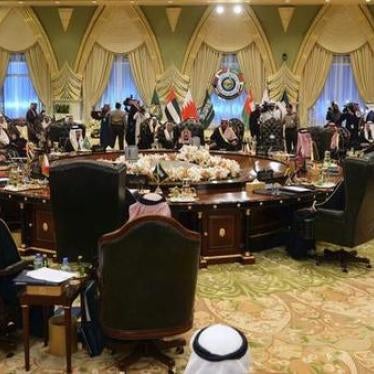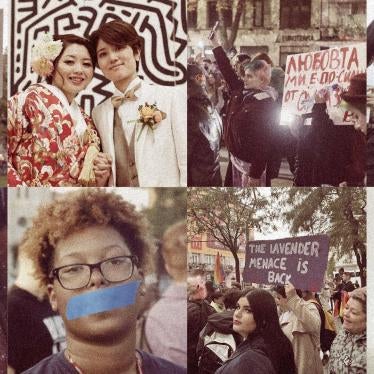(Kuwait City) – Kuwait’s government has in the past year escalated punishments against people critical of the government, Human Rights Watch said today as it released its World Report 2015.
The Kuwait government should take urgent steps to amend national laws that officials are using to crack down on free speech, and stop revoking citizenship to punish its critics and peaceful opponents. Over the past year, officials have brought charges against a number of critics. The government has also revoked the citizenship of critics in three cases, leaving them stateless.
“The Kuwaiti authorities seem to think that it is not enough to use lengthy jail sentences to punish critical tweets and other peaceful dissent,” said Nadim Houry, deputy Middle East and North Africa director at Human Rights Watch. “Now they are also twisting the entire concept of citizenship to strip critics of their nationality rights.”
In the 656-page world report, its 25th edition, Human Rights Watch reviews human rights practices in more than 90 countries. In his introductory essay, Executive Director Kenneth Roth urges governments to recognize that human rights offer an effective moral guide in turbulent times, and that violating rights can spark or aggravate serious security challenges. The short-term gains of undermining core values of freedom and non-discrimination are rarely worth the long-term price.
The Kuwaiti government aggressively cracked down on free speech throughout 2014, using provisions of the constitution and penal code, and laws on printing and publishing, public gatherings, and misuse of telephone communications, as well as the national unity law of 2013.
The government put into effect a new telecommunications law in May that imposes severe penalties on people who create or send “immoral” messages, and gives unspecified authorities the power to suspend communication services on national security grounds. Any communication service provider that “contributes” to the dissemination of messages that violate these vague standards can be punished. The law provides no opportunity for judicial review.
As 2015 began, the government took further action against its critics. The recent actions, reported by human rights sources, include the arrest of a former lawmaker, Saleh al-Mulla, on January 6 for insulting Kuwait’s Emir and Egyptian President Abdel Fattah al-Sisi in tweets; a warrant against Nawaf al-Hindal, a human rights activist, on January 27, while he was out of the country, over tweets about Saudi Arabia’s late King Abdullah; the arrest on January 28 of another activist, Mohammed al-Ajmi, for insulting Abdullah on Twitter; and a five-year sentence for Abdulaziz al-Mutiri, another activist, on January 29 for insulting the emir on Twitter.
Over the past year, Kuwaiti authorities have stripped at least 33 people of citizenship for various reasons, including some government critics for “acts aiming to undermine the country’s security and stability, bringing harm to its institutions.”
Among them were Ahmed Jabr al-Shammari, owner of several media outlets that had defied a government ban to publish a story; Abdullah al-Barghash, a former opposition leader in parliament; Nabil al-Awadhi, a conservative cleric widely known for his TV talk shows; and Saad al-Ajmi, the spokesman for Musalam al-Barrak, a leading opposition politician. All four told Human Rights Watch that they believed their citizenship was stripped for criticizing the government and that the revocation had left them stateless. The revocation process does not allow appeal or review.
During 2014, Kuwait’s “Bidun,” more than 105,000 people historically not considered citizens, protested their stateless status, with at least seven arrested. The 1979 public gatherings law bars non-Kuwaitis from participating in public gatherings. On January 29, Abdelhakim al-Fadhli, a Bidun human rights activist, was sentenced to one year in prison followed by deportation for participation in a protest in 2014. Human Rights Watch has urged the government to create a timely and transparent mechanism to review Bidun citizenship claims that incorporates international human rights standards.
The Justice Ministry took steps to block women from applying for legal researcher posts until the two-year evaluation of the first group of women admitted in 2013 is completed. Under the program, women can eventually pursue careers as judges. In April, a court struck down the Justice Ministry’s veto, opening the way for 21 women to gain admission to legal researcher posts by November.








